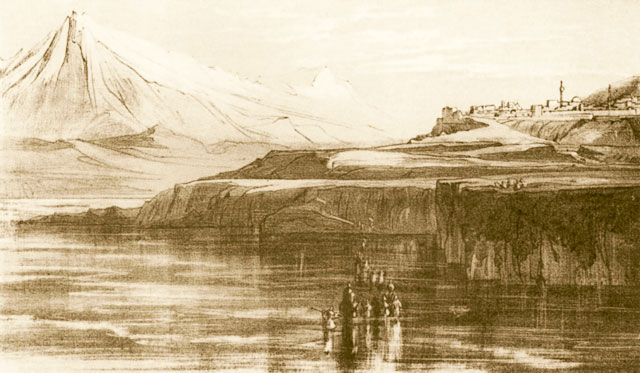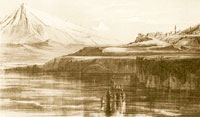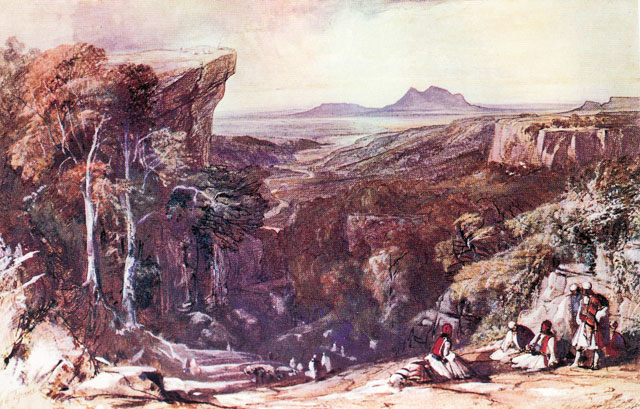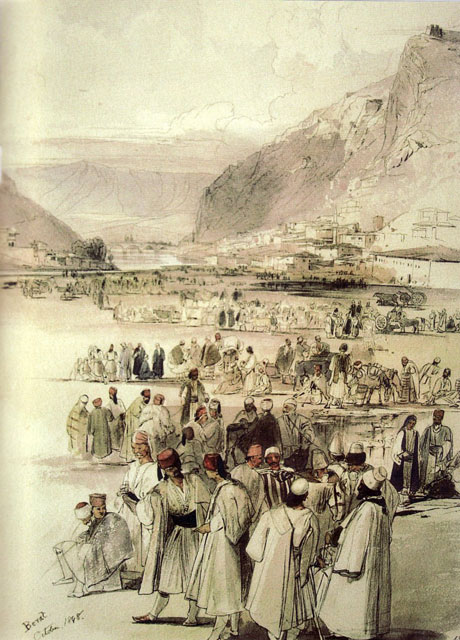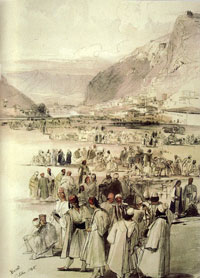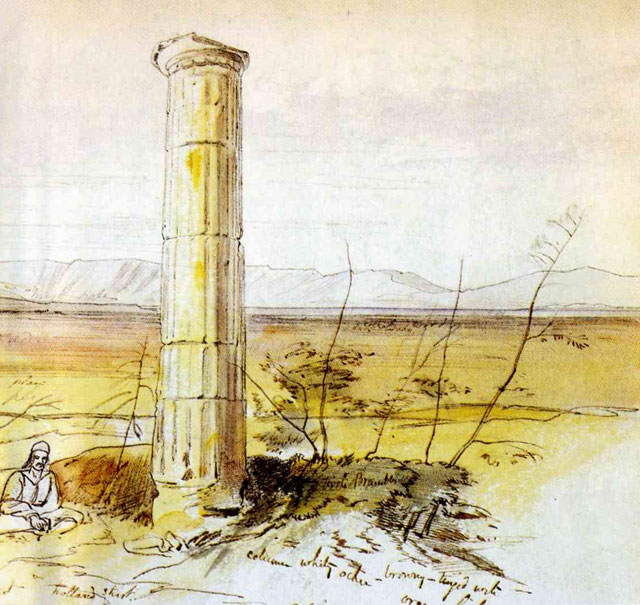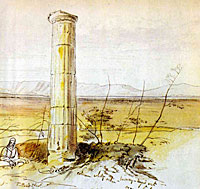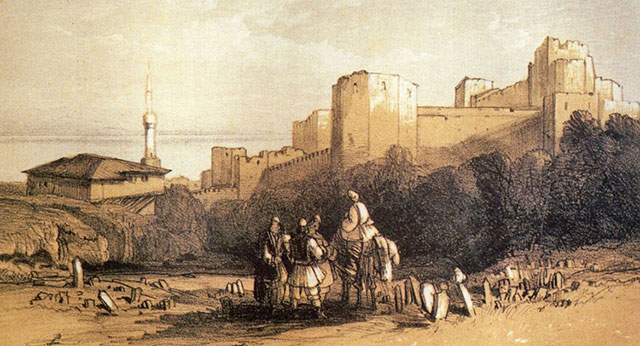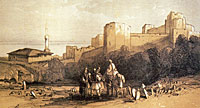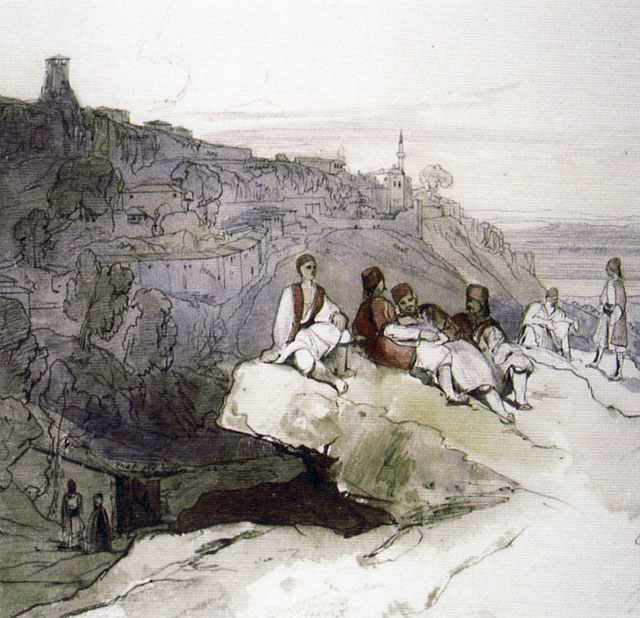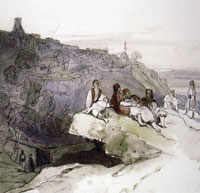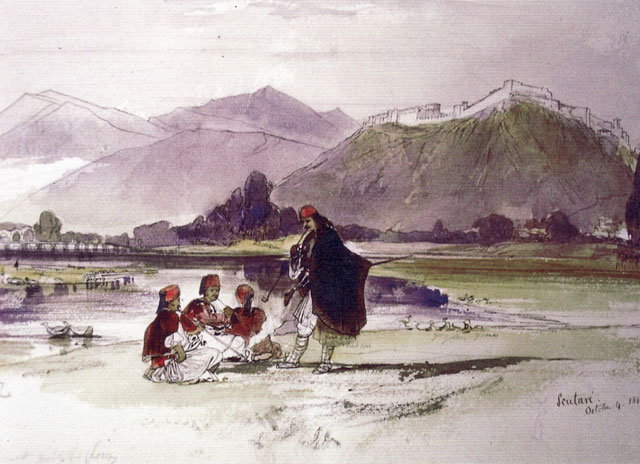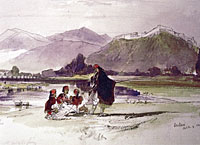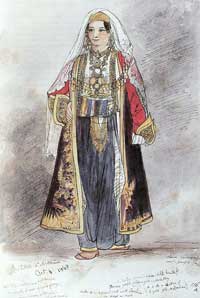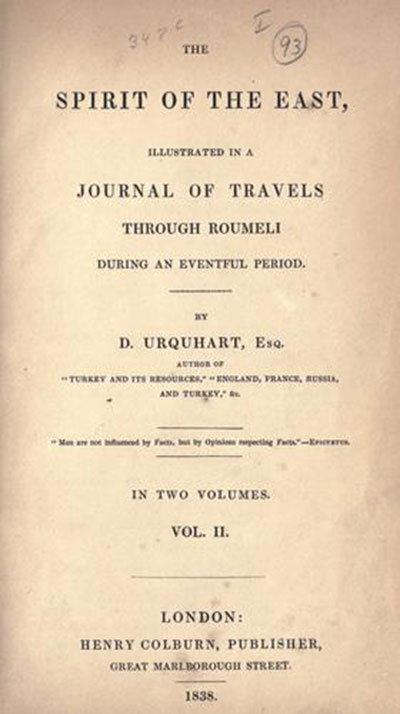| | Robert Elsie | AL Art | AL History | AL Language | AL Literature | AL Photography | Contact | |
Robert Elsie
Texts and Documents of Albanian History
BACK | AL History
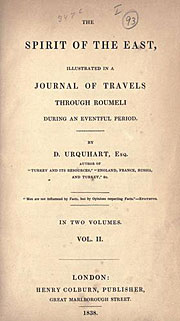
David Urquhart:
The Spirit of the East
(London 1838), title page
1831
David Urquhart:
The Spirit of the East
Scottish political figure and writer, David Urquhart (1805-1877), travelled to Greece in 1827 with Lord Cochrane to champion the Greek cause in the war of independence there, and in 1831 he was appointed to Sir Stratford Canning’s mission to Constantinople to settle a border dispute between Turkey and Greece. In 1835 Urquhart served briefly as secretary to the British Embassy in Constantinople. From 1847-1852 he was a member of parliament for Stafford in northern England, and died in Naples in 1877. David Urquhart was the author of six books. Of Albanian interest is his two-volume “The Spirit of the East, Illustrated in a Journal of Travels through Roumeli during an Eventful Period,” London 1838, from which the following extract (from chapters 19-21) is taken. In November 1831 Urquhart sailed from Corfu to Saranda and visited Gjirokastra, Tepelena, Berat and Kavaja. After getting lost along the Erzen River and being saved by a Vlach shepherd, he continued on to Durrës, and northwards to Shkodra. His descriptions of Albania reveal a stagnant country languishing under the weight of a decaying Ottoman Empire.
The Spirit of the East
Chapter XIX
Tepedelene – Reception at Berat – The GueguesAfter this long digression, I must remind the reader that we have left Argyro Castro [Gjirokastra], on our way to Scodra [Shkodra]. I arrived next at a place, the name of which calls up a thousand interesting associations, and which I entered with a feeling of respect which an Albanian would have been proud to observe in a stranger; - that place was Tepedelene [Tepelena], the Croya [Kruja] of the modern Skander Beg. Arriving at it from the south, the beauty of the position, and the effect of the castle, are lost. I came at once upon a heap of ruins, and wandered about among them for some time, and under a shower of rain, before I found the house of the Aga. On approaching it, I had been met by companies of peasants, dragging towards Janina the guns that once had frowned over its battlements. The once proud Tepedelene, now sheltered but one hundred and fifty Albanian, and eight Greek families, and, as if this amount of ruin and desolation were not sufficient, the troops there assembled were busied in leveling the fortifications to the ground. That work, however, had not yet commenced on the lines of white walls and towers that crowned the steep that looks to the north, and the base of which is encircled by a rapid, and not inconsiderable stream; so that, as I left the place after being ferried across the water, I turned back to cast on Tepedelene, the last stranger glance which ever would fall on its doomed battlements and towers. This scene of surpassing beauty left me, forgetful of the coming night, to linger there ere I turned away; the evening sun gilded the snow-white walls, while the recent shower had brightened the deep winter green of the surrounding landscape, over which rose the brown steep sides of the hills, their crests powdered with snow. Tepedelene, on its rock, stood boldly forward in the midst of the picture, and the swollen torrent dashed foaming round its base.
Edward Lear.
View of Tepelena (Tepedelene),
October 1848.But I must not leave this place, without some record of my visit to the Governor. He told me that twenty-four guns were to be dragged to Janina, but that the weather was so bad, and the country so difficult, that the labour was immense; that one heavy gun had fallen over the side and lodged in the river, and that it had been necessary to collect two or three thousand men to get it out. This, while it might appear on one side an Eastern metaphor, was, on the other, a real representation of Albanian mechanics. I took occasion, upon this, to extract a calculation of the labour requisite to drag these twenty-four guns to Janina, which amounted to one day’s labour of ten thousand men. This being by his own admission, I suggested the advantage of constructing a road, which perhaps four times that amount of labour would suffice to do, which would not only enable them afterwards to drag these guns with oxen instead of men, but which would facilitate the transport of all they ate, wore, consumed, produced, bought, and sold. My logic was, however, superfluous, for the chief, and all the by-standers, had already arrived at the same conclusion, and the answer was, “Tell that to the Grand Vizir.” The destruction of the Castle was, however, a sore subject, even to the victors; they asked me if I did not think it was dreadful to destroy what it had cost their fathers so much labour to build? I could only answer by some commonplace remarks about the blessings of tranquillity and universal peace; and was asked, if we had not got a great many castles in England. Being tired of recurrence to these wooden fortresses, our superiority in which is so often quoted, only that our inferiority in all other material force should be inferred: - I answered that we had “a great many castles – our beasts!” and immediately arose an exclamation, in Turkish, Greek, and Albanian, one in sense, but diversified in sound, “Doghru der,” “Kala lei,” “Mir thoet,” or, “He says well!”of the same tchibouque with the Bey Manie of Croia, to find everywhere a friend and protector.”
Here, as elsewhere, there was a great interest evinced in Poland, and anxiety for news or information respecting its condition; they inquired why the Poles, who had taken refuge in other countries, had not come to them; that Turkey would not only have received and protected them, but would have given them lands and wives. But the refugees mistook their way, as the revolutionists miscalculated their hour. I had seen the Albanians in their wildest mood, and their worst days; I now saw them in a state of subjugation, but which, I hope, is also one of transition. If ever I should again visit their beautiful country, I may be rolling over terraces and roads in the midst of tranquillity and peace, the landscape formalised with fields and hedges, and the romance of war, and the interest of alarms, replaced by homely industry and ignoble wealth. Tranquillity, it is true, did now exist, but it was the tranquillity of fear; security I enjoyed, but it was a security bought by an apparent partisanship with the victors.
Edward Lear.
Scene near Mount Tomorr
in central Albania, October 1848.
As I advanced, the country became less wild and rude, and the river, swelled in volume, was still in sound, and straitened in its bed. Night soon overtook me, and, after two hours’ toiling in the dark, through the deep mud of the roads, and under torrents of rain, which, thanks to Mackintosh, fell upon me but touched me not; I was received under the miserly covering of a wretched khan, toasted in the smoke of a green-wood fire, and treated to a not unwelcome supper of Indian corn and resinous wine. In order to reach Berat next night, I had to start three hours before daylight. The rain continued, mixed with snow; peals of thunder rolled over our heads, and flashes of lightning, now and then, happily directed our uncertain steps. That blasts from the Albanian mountains became more piercing, as we ascended the passes of the Glava; and, though the sun rose not to our eyes, day broke over one of the most bleak and dreary prospects I ever beheld; the heavens were black, and the earth white. The rugged and inhospitable pass was crowded, however, with Albanian coulias, or little castles; one by itself, or two together, or ten at most, in the same vicinity, forming a soï, or race, which are bound together for the purposes of injury and defence; and if not always linked by consanguineous ties, are united by the undistinguishing vengeance of stranger blood, which may have been shed in their ceaseless feuds.
A numerous guard had attended me as far as Tepedelene. I had there got a fresh troop; but difficulties respecting horses having arisen, even though I had paid for them, and not wishing to be detained, I proceeded, attended only by a couple of Skipetars; and I afterwards ascertained that this, the only portion of my journey where I was unguarded, was precisely the most dangerous portion of the whole route. I confess that I would much rather have found myself in Corfu than where I was, when, towards the summit of this pass, notorious for the handiwork of its savage inhabitants, I perceived several of these mountaineers armed to the teeth, hastening to intercept my passage. The traditional mode of commencing business in that quarter is to demand, not your purse or your life, but – snuff! My new acquaintances asked, indeed, for my snuff-box – a very modest sort of inquiry to make. I answered, that the days of “snuff” were gone by, but still, that they were welcome to my tobacco-bag. They answered, sullenly, that they had not yet learned to smoke, and allowed me to pass without molestation. A little after I reached a khan, where there were several Albanians, a Greek boy, the khanji, served me as interpreter. They told me that their country produced corn sufficient only for four months consumption in the year; that the Sadrazem had taken the bread from Albania, and they never would enter the Turkish service. I asked them what they intended now to do? The Greek lad burst into a fit of laughter, and said, they are “sitting,” waiting for the Grand Vizir to die; and treated them in other respects in a way which I was astonished not to see bring down ready vengeance on his head; but the spirit of the Albanians is broken; each individual of the nation is a changed being; and, as they said themselves, “their hearts are cold and their lips parched.”
Edward Lear. People in Berat,
October 1848.
It was nearly sunset when I reached Berat, the Arnaout Belgrade, romantically situated between the lofty rock on which stood the castle, and the mountain from which that rock has been severed by the river Beratino. Along either bank of the winding stream is spread the town, and the two banks are united by a high and handsome bridge. Here the Greek women wear yashmacks and feridgees like those of the Mussulmans. I forgot to mention, that at Delvino the Mussulman women wear the most ludicrous dress that woman’s fancy ever invented; which consists of a white wrapper, covering them from the top of the head to the feet, with two half sleeves, into which their elbows are thrust, their hands being crossed upon their breasts, and their elbows stuck out at right angles. In this way they stalk about like rough-hewn marble crosses. This white wrapper opens at the face, however, to display a black mask, with two holes for the eyes. To all my inquiries as to the origin of this singular costume, I got one invariable answer, ετςι ευρήθικε – “so it has been found.”
At Berat my reception was of an extraordinary and instructive nature. I have before dwelt on the social distinctions made between Mussulmans and Christians; and the reader has seen some of the difficulties in which I have been involved, in consequence of attempts to emancipate myself from the common treatment reserved for Europeans. But I have re-written, when better acquainted with the subject, the account of circumstances which occurred in the process of gaining that information. Notwithstanding all the means of intercourse I had previously had, I feel myself indebted to an incident at Berat for ideas on the subject, which rendered it more clear to me than it had been before.
The news of my return to Albania had reached some of my old friends, who were delighted at a mark of so much interest taken in them by a European; and among whom the curiosity respecting Europe, which, during the last few years, has been so rapidly growing throughout the Turkish dominions, had been quickened by the incidents of my last journey, and by those personal associations which are the necessary basis of international regard. Not only, therefore, did I find at Berat every disposition to receive me in the most friendly manner, but letter had also arrived, enjoining the exhibition of those dispositions which were already so favourable. The Governor, it was true, was absent; but his son, a youth of twenty, who filled his place, seized, with the warmth of his age, the opportunity of gratifying his predilection for the new order of things.
The Bishop being absent, the young Bey had the Episcopal residence prepared for me, and sent thither his own train of Mussulman attendants. I was visited by the most distinguished people of the place; and thus surrounded by all the necessary appliances, caught the practice of Eastern ceremonial with that ready scholarship which ever attends the assumption of greatness. For the exact mode of salutation to guests of all degrees – for the particular point of the room or stairs where they were to be met – for the mode and degree of rising – the exact measure of the salutation – the spot where they were to sit – for the inquiries that were to be made, or the answers that were to be returned – I must refer the reader to the details I have given, in a previous sketch, of Turkish manners.
Next morning, I took leave of my youthful host, not without a promise of returning to Berat. He could now, he said, only dream that there had been a European at Berat; and that my short visit had left him with wishes excited, but not gratified. A few months afterwards I learned, with sincere regret, that this fine young man had met with an untimely grave.
Edward Lear.
Ancient column in Shtyllas
near Fier, October 1848.
I now entered on the beautiful champaign country that stretches to the north, and travelled twenty miles across a dead level, which appeared like the unruffled surface of a lake, and was cropped close by sheep. I had a letter from Berat to a Turkish Bey, at whose house I was to sleep; and here, for the first time, I was served in a Turkish house before the master. “Nothing is so striking as the change of manner now so rapidly taking place; every day, the attentions I receive seem to exceed those of the preceding one.” The foregoing phrase was written at the time; I did not then understand that the change was in me, not in them.
The next day, in the afternoon, I arrived at Cavalha [Kavaja], and on entering the place, which contains between two and three hundred Guegue families, I met Ibrahim Bey, the proprietor of this place and the surrounding country, accompanied by a troop of savage and picturesque looking horsemen; but they all fell short of the ferocious air of their leader – a man guilty of every crime, and stained with every vice, and detested alike by Turks and Christians. The blood of his nearest relatives was on his head.
He possesses – in the way that an Albanian Odjack possesses – an extent of country thirty miles in every direction. I had now fairly entered into the country of the Guegues: they are the northernmost of the three general divisions of Albanians; – the first, to the south, called Châmi, of which Janini [Janina] is the capital; the second, composed of Toxides, the Liapes, and others, extends to Berat; the third, from Berat to the mountains of Monte Negro and Bosnia, are the Guegues. These last, though speaking a dialect of the Skipt, or Albanian, are strongly tinctured with Sclavonian blood; whereas, to the south, the influence of Greece has more prevailed. The Guegues have a distinct costume: they wear the fustanel, or large white kilt; but the short jacket of the southern Albanians is with them prolonged into a skirt – descends as low as the extremity of the fustanel, and is bound under their belt, so as entirely to cover the fustanel behind. The colours they affect are crimson and purple; and these, with their red caps, white fustanels, red leggings, and gold-embroidered vests, gives a richness and splendour to their appearance, especially when assembled in numbers, which exceeds, even in effect, that most elegant of costumes, the southern Albanian. I never saw any thing more beautiful than the groups of children. The paleness of complexion which, even in infancy, casts its invariable shade, here yields to the joint influence of the mountains and the north. The little creatures wear, in miniature, the formal dresses of their sires; and the delicate crimson of their cheeks is matched with that colour which supersedes every other in their costume.
Chapter XX
Midnight Adventures – Durazzo – Turkish Notions on Commerce – European Consuls
and Residents – The French in Egypt – Mehemet Ali Pasha – Northern AlbaniaLearning that an old friend of mine was Governor of Durazzo [Durrës], I resolved to hasten on to that place the same evening. The distance was three hours; so, leaving the inhospitable Cavalha at an hour before sunset, I hastened on alone, to reach Durazzo as early as possible. My haste, however, brought me no speed; instead of following the coast, to reach Durazzo, situated on a narrow neck of land, I struck to the right, and got on the road leading from Durazzo northward. I spent a miserable night, having two or three times got entangled in quagmires; and at length reached a village, where I was assailed by troops of dogs. I succeeded, however, in arousing the inmates of a house. My appearance, or at least the noise I made, soon created an alarm, but there was no possibility of understanding a word on either side; and a light presently appearing within, I had the satisfaction of seeing half-a-dozen men shadowed forth at the different windows, each with his musket. I thought it now high time to retreat, even if to the quagmires; and, making the best of my way out of the enclosures that surrounded this inhospitable abode, I did conceive my troubles were all over, when I came to a well-beaten road. This, of course, could only lead to Durazzo, and I proceeded confidently, if not heartily, along; but a few hundred paces brought me to the edge of a small river. Seeing the path directed to the ford, I pushed in without hesitation: the water came up to the middle of my saddle; but I thought my horse was just about to step up the opposite bank, when he suddenly lost his footing, and we were both carried down by the stream. My accoutrements put every attempt at swimming out of the question; but though carried under, I still held by the bridle, and relinquished it only for the tail of my steed; which, turning, struck out for the bank we had left, and which we soon regained. But my horse no sooner reached the firm ground, than, shaking me off, he scampered away, leaving me in as pretty a plight as any lover of adventure could desire. But, what was now to be done? It was no consolation whatever for me to think, that it might have been at the very spot that the same accident befell the Emperor Commène, on the night that followed the memorable battle of Durazzo; when the imperial army, composed of Greeks and Turks, Circassians and English, was routed and scattered to the winds by the victorious lances of Robert de Guichard and his Normans.
I had escaped from the bogs, I had been snatched from the river, I had run from the dogs and the muskets, which way was I now to turn? Without a horse, unable to walk, without a word of any intelligible language at my disposal, hungry, shivering, and exhausted; drenched from top to toe, my boots filled with water, my ample shalvars and cloak weighing what might have been worth something in gold, and this on the 18th of December! The only thing to be done was to sit down on the bank of the river, and to wait for the 19th. It dawned at length; and, not long afterwards, one of the wandering Vlachs (shepherds) came down to water some cattle, at the spot where I had entered the river, and to which I had returned. I then discovered, that what I had taken for a path and a ford, was merely a place for watering and washing the cattle of the village. In the plight in which I was, I would have carefully concealed myself from a Guegue, who might have fancied my shalvars, though neither the shape nor the favourite colour of the country; from a Vlach I had nothing to fear, and, giving him to understand, by dumb show, and by the state of my vestments, the misfortune which had befallen me during the night, he gave evidence of his comprehension, by thrice devoutly crossing himself on the forehead and breast, and uttering a long whistling ejaculation. But, for his calling, it was natural that his first thought should be respecting the welfare of my horse; so, putting out the forefinger of his left hand, and crossing it with two fingers of his right, he began a trotting motion, casting his eye the while from me to the river, and then all along its banks, as if to ask in what part the trotting animal was to be found. I answered, by a galloping motion of the hand and arms, and pointed to the road to Cavalha. He suddenly set to work, like a man who had got a new idea, took my wet cloak, folded it, and threw it on the back of one of this animals, which he led to the side of the bank, and, repeating the foregoing diagram with his fingers, intimated to me an invitation to ride, which he had not twice to give. He also mounted, and, driving his other cattle before him, commenced screeching what they call a song, and left me to follow as I might. I thought, of course, we were going to the village, but we turned off to the left, and in about half an hour reached a small encampment of Vlachs, where, stopping at a door, he shovelled me in, and went on about his business. It was just sunrise, and I found myself in a solitary tête-à-tête with an old woman. She stared at me, and waited to be spoken to. I thought it necessary to utter some sounds in the way of speech; she immediately cried, “Whisht,” putting her finger to her lips, and placing a stool near where the fire had been, motioned me to sit down. She then pointed to a bed entirely covered up with a coverlid which had an air of finery ill suited to the place, and, inclining her head upon her open hand, gave me to understand that some great personage there reposed, whose existence and slumbers I soon became convinced of by that involuntary music so modestly disavowed by its most successful performers. A blazing and comforting fire was lit in silence, and, while the steam rose all around me, I was left for a full hour, to ruminate on the character of the invisible personage in whose presence I was, when suddenly the bedclothes were thrown off with a jerk, and a figure bolted up to half its height, displaying, under a white wadded night-cap, a dark lank countenance and long black beard, and I perceived that I was the guest of the priest of the Vlach encampment. After the necessary yawns and stretchings, the obsequious handmaiden succeeded in directing his attention to me, when, taking me for a Cavash, he jumped up, came to kiss my hand, and to inquire, in sounds unknown, the purport of my visit. I soon discovered that he spoke Greek. His apprehensions quickly subsided; and after crossing himself, and wondering at my adventure, began to make himself more merry at my expense than I was inclined to be satisfied with. However, a comforter was soon produced, in the shape of a bottle of rakki, which was followed by a breakfast, by no means to be despised, of a hot Indian-corn cake, and fresh drawn milk. My clothes were hung up to dry; and after that, two good horses were at the door, one for myself, and one for the Papas, who declared he would accompany me back to Durazzo, which I found I had passed six miles. On the way, I met some soldiers, who had been sent in quest of me, my disappearance having excited some alarm; and although my friend, the Governor, was absent, his Vekil had sent parties out in various directions to look for me.
Durazzo is a place, the importance of which is illustrated by the historical events with which its name is connected. Barlettius, the contemporary historian of Scanderbeg, and who had seen Dyracchium at the closing scene of the drama of Rome, thus describes it:
“Dyracchium is the most ancient and powerful of the maritime towns of Illyria, fortified by nature, and rendered impregnable by art. He who sails by is struck, on looking on the height of the walls, not only with admiration but with terror, for it is surrounded by rocks and the sea, except where it joins the land. Here is the most safe and commodious port – here are ample and beautiful plains, most fertile soil, and abundance of all things – here are consecrated buildings, august and sumptuous temples – here are to be seen the images of kings and emperors, and the monuments of their ancient princes. The Colossus (Colossus ingens) of Hadrian, of cast metal, stands in a lofty position at the Cavalha Gate. To the west there was, besides, an arena or amphitheatre, constructed with wonderful art and beauty, and walls strengthened and adorned with towers and splendid works; but it is particularly remarkable for its saltpans and convenience for commerce. This is that Dyracchium which saw the Roman senate, and was no less renowned than unhappy by civil blood and intestine war; and finally, what the greatness of this city has been – ipsa ruina docet.” But the ruins themselves have now ceased to teach.
The present Governor of Durazzo, although he knew not of the past splendour and prosperity of Dyracchium, although ignorant of the traffic here carried on by the Venetians, yet expressed himself respecting it in the following terms:
“Along our western shore, which looks on Europe, we have not a single safe or convenient harbour; so that the peasantry, through all these districts, have to supply themselves from Monastir with goods, brought sometimes sixty days’ mule carriage, from Leipsic, Constantinople, and Salonica. Durazzo only requires a mole to be run out from the horn of the at present exposed bay, to give shelter to large vessels within, and afford them, at the same time, the immense advantage of a mole for lading, which no port in Turkey, save Constantinople, possesses. This place is, besides, the centre of all communication by land; and from twenty to thirty hours, in all directions, the roads are level, and might be easily rendered passable for wagons. I would undertake to drain the marshes, make three roads for that distance, and construct the mole, if I were allowed for five years to retain the customs of the now unfrequented port, and the produce of the scarcely productive salt-pans.”
“But,” I observed, “if your government pursues the course it has commenced to adopt respecting commerce, the mole, if built, would not be much frequented. By your treaties with us, three per cent is all you have a right to exact for the entry of foreign merchandise; and in this very port you exact at present five per cent.” “I say,” replied the Governor, “the three per cent is robbery; because our harbours are filled up, our moles ruined, for the support of which alone that per centage is claimed. It is commerce alone that gives value to our possessions, and turns our harvests into treasure. If a government affords it not a shelter, a landing-place, nor a road, it certainly has no right to fees or tolls.” What would he have said of a government whose science resides in impeding commerce, either under the plea of raising revenue, of improving prosperity, or of protecting agriculture?
Edward Lear.
View of Durrës (Durazzo),
October 1848.
There was a shipment at the time proceeding of most wretched tobacco, for the supply of the Austrian monopoly of Italy, at the rate of rather more than one halfpenny per pound. It is delivered damp, ill made up, and in the worst possible state; it heats on the passage very often, and has then to be thrown overboard. I was expressing my surprise, that when the peasants were at the trouble of sowing, reaping, and transporting tobacco for so small a sum, they did not expend upon it the additional labour necessary for drying and packing it, which would more than double the value of the article. The Bey answered (and to this answer I beg particular attention), “The care and labour required to cultivate and prepare tobacco well are very great, and how can these peasants expend that labour upon it, when they have to grind their corn, and to manufacture their clothing, with the rudest machinery?” He was of opinion, that if England manufactured for the tastes of the people, and if Turkey could venture to abolish the prohibitions on exportation of her own produce, which have been silently and one by one introduced, (1) England would have the entire supplying of Turkey, and Turkey would be benefited as much as if one-fourth were added to her population.
On entering the town, I was stopped upon a narrow causeway by a string of mules laden with bales of Manchester goods and Birmingham wares: good which figure in our exports to Austria, and which had been brought from Trieste in three vessels, then anchored in the bay, and which were to take back the tobacco to supply the Austrian Appalto of Italy. Such are the links that now bind Italy and Dyracchium. The bales of goods, however, and the ships in the bay, cast into the picture of the place some Western touches, which were multiplied in passing through the streets by the mean figures of European sailors and pettifogging merchants. I felt quite ashamed of the quarter of the world to which I belonged, when I was told by the captain of the Albanian Guard that I would now find myself at home, as there were compatriots of mine in the place, and that the Consul was already prepared to receive me. The Consul! an Italian Consul at Dyracchium! the descendant, the representative, too, I suppose, of the first Caesar, who here had intrusted his fortunes to a fishing-boat. Scarcely had this important fact been communicated to me, when the Consul himself was announced; and hardly should I have been more surprised at the apparition of the ghost of the great Consul himself, than I was at the appearance of the representative of the house of Lorraine, vulgarly called Hapsburgh, who now stood before me! A red coat and a pair of epaulettes were not enough to shadow forth the dignity of this personage. A cap of purple velvet, embroidered with gold, was displayed in one hand, held carefully by the lining, so as to exhibit without damaging its splendour; while in the other dangled, with the apparent carelessness of an every day companion, an elegant pouch of crimson and green velvet similarly embroidered on the seams: containing, no doubt, a specimen of the tobacco of which he was superintending the shipment to the warehouses of his imperial master. These Austrian consular costumes might furnish an appendix to Sibthorpe’s Flora Graeca; no doubt they astonish the natives very much, and give them a high notion of the dignity of the empire; certain it is, the wearers are enchanted with them: and I have known one Austrian Consul, who, after investing himself with the prized insignia, could not, for three successive days and nights, be induced to relinquish one item from his new wardrobe; surpassing the hardihood of the knight of old, who did unbuckle a single spur when inclined to unbend his knighthood.
The dignified person in question soon communicated to me a vast mass of information. He informed me that the Albanians deserved to be all hanged; that the Greeks merited no better fate; that the ‘poveri Turchi’ were much to be pitied between them; that the Grand Vizir had gained no victories, obtained no success, but he gave me to understand that, if he had only a few regiments of the Hungarians that were doing no good in Lombardy, he would put all things soon in order.
The Austrian agents, somehow or other, manage always to disgust the people amongst whom they reside, (2) as the government itself, with all the calmness and judiciousness, is always a decade in arrear of events. While the Austrian government counselled the Porte to that resistance, justifiable no doubt, but untimely with respect to the affair of Greece, which led to the war of 1828 and 1829, an Austrian Consul to render the Greeks as dissatisfied with Austrian views as the Turks had been with Austrian advice, declared that he “could no longer believe in a Divine Providence after the battle of Navarin!”
However, Austria had another sort of representative at Durazzo in the person of a young man, the agent of a commercial house at Trieste, who spoke fluently Greek, Albanian, Turkish, Bulgarian and Wallachian; who frequented freely all the fairs of Roumeli, laughed at the alarms of Europeans, and assured me that he had never suffered molestation of any kind, and found in his European character (combined with a knowledge of the country), not only protection against the accidents of the times, but immunity from many of the inconveniences which native merchants had to endure. There were one or two other young men who travelled in the same way, and to the connexion thus established between Albania and Trieste, was owing the importation into the former from the latter of the English goods, the caravan of which I had met as I entered the town. English colonial produce, re-exported from the free port of Trieste to the coast of Albania, is smuggled into Hungary through Roumeli and Servia. This occurred during those times of trouble which would appear to put an end to all peaceable intercourse; two years later, I found at Widdin [Vidin], coffee that had been transported across the country from Durazzo, in consequence of the tendency at Constantinople to imitate European customs, and to embarrass the operations of commerce.
The facilities, and the freedom enjoyed by the agents of these commercial houses, in the midst of war and revolution, is a valuable illustration of the habits of thought of Eastern countries; because the position of those persons here was not the consequence of any exceptional circumstances, it was merely the consequence of the rare fact of familiarity with the language, without which no useful intercourse of any kind can be practicable; (3) and if there is one portion of the Ottoman dominions more than another where such an intercourse would offer little promise of reciprocal benefit, that portion certainly is Albania.
This circumstance recalled to me the conduct of the French merchants in Egypt. Previously to the expedition of Bonaparte, the Directory left no means untried to pick a quarrel with the Beys, and on withdrawing their Consul, ordered all the French merchants to retire. Some of them did so, but the major part refused to quit the country, and laughed at the representation of the government agent respecting the dangers to which they would be exposed when the regular protection of the nation should be withdrawn. Those not suiting the view of the French Commissioners, and the merchants having expressed their determination of not quitting the country, these latter were denounced to the Egyptian authorities as disobedient subjects, in whom the Republic took no further interest; thus exciting the lawlessness or the avarice which they pretended to dread, and which would have afforded to the French government some pretext for the greatest outrage on public justice which has occurred for centuries; namely, the invasion of Egypt without declaration of war – an outrage unfelt in Europe, because its victims were all the Turks. (4) The French merchants, to avoid the persecution of their countrymen, retired up the country to Cairo; and there, unmolested, carried on the traffic up to the period of the invasions. (5)
When such is the conduct of warring Mamelukes, of rebel Arnaouts, towards unprotected European merchants, it may cease to be a matter of wonder that the Porte respected the rights of the British on the flight of Mr. Arbuthnot from Constantinople in 1807; or when, at a later period, the inconceivable policy in which we were plunged, forced the English Ambassador to abandon to their fate those of this compatriots whom he left behind him.
Edward Lear. View of Kruja (Croia),
October 1848.At Durazzo, for the first time, I heard of Mehemet Ali, as connected with the affairs of Albania. I got into conversation with a man whom I understood to be a Turkish merchant, but our acquaintance having rapidly ripened into confidence, I learnt that he was one of those agents whom the Porte employs, or rather whom influential members of the Divan employ to collect information. In this capacity he had travelled into Egypt, Arabia, and Bagdad, and was returning to his patron, the Grand Vizir, with an account of those countries. I gathered from him what I had subsequent opportunities of becoming well acquainted with, the views of Reschid Pasha upon Egypt. I had hitherto looked upon the war of Albania as a finite object. Now the connexion between the state of that country, and the destinies of the whole empire, became practically evident, I perceived that Reschid Pasha looked to drawing large resources both in means and men from subdued Albania, which should be directed to the subjugation of Egypt. He had been defeated in the object next to his heart – the reduction of Greece – by the insubordination of the Albanians, and by their settled resolution not to put an end to a war which, to them, was an unceasing source of pay, plunder, employment, and power; he had now subdued Albania, and therefore could have directed an overwhelming force against Greece, but European diplomacy had stepped in and closed against him, by an insuperable barrier, this career of greatness and renown. What enterprise then presented itself worthy of the position he had acquired? What field offered itself to occupy that military spirit of the Albanians, which, if not directed now by the Porte, could scarcely be mastered by it, and would probably soon again be directed against it? Egypt was that field, and Mehemet Ali the rival, and the enemy of the Grand Vizir of old was an antagonist worthy of him. These ideas suggested themselves in consequence of the following answer, which I received from the secret emissary to the inquiries I made respecting the state of Egypt: “Mehemet Ali,” he said, “has done well in every thing that he has created, ships, sailors, arsenal, and soldiers; but the poor are oppressed, and he neither has the heart of this people, nor the name of the Sultan. His troops and his ships would beat ours, but if our Sadrazem were to appear in Egypt only with 10,000 men, Mehemet Ali’s troops and ships would be his, and he would not find a mountain to fly to, and has not a tribe to defend him.”
My horizon was thus suddenly extended, not that a great deal of uncertainly did not overhang these lucubrations, but that uncertainty was to be dispelled by a trifling incident which occurred in paying for the horses which were to take me to Scodra – I received the change in Egyptian coin. Whence did this money come? The troops mustered against the Grand Vizir by Mustapha had been partly paid with this money, incurring, of course, a considerable loss in the exchange. Mehemet Ali had then a strong presentiment of the views of the Grand Vizir and of his own danger, and had made this sacrifice, precipitate and lavish as the mode shewed it to be, to prevent the subjugation of Albania, and to occupy there the Grand Vizir. I was now, of course, ready to prophesy the affairs of Syria, and the news of the attack of Acre was scarcely a novelty. But, good God! what was English diplomacy about?
Full of these ideas, I wended my way from Durazzo northward along the coast. From Berat, northwards, the country may be called champaign. The plains form basins, bounded by low argillaceous hills. The limit of this formation, to the north, is the chains of Leche [Lezha], Croia [Kruja], and Gova, bearing N. and W., S. and E., dipping to the E. N. E., and exactly corresponding with the chains of Argyro Castro and Longaria [Lunxhëria]. This limestone formation, described at Argyro Castro, has been broken in fragments, and is scattered over the face of the country, from Scodra down to the Gulf of Lepanto. It is distinct from the central range of the Pindus, against which it sometimes rests: it dips, in Middle Albania, to the north and east, and in Acarnania, to the east. To the north of Argyro Castro, on the back and on the face of these elevations, rests a formation of mixed aluminous shale and slate; some layers are very soft, and decompose readily into clay. Thus, all the valleys and plains, and even the sides of the hills, are covered with clay. To the north of Leche, where the Drin bursts through the hills, this formation does not accompany the limestone, which here wears the aspect of the uninteresting limestone of the Morea, not being of the fine lithographic grain parallelly stratified, and alternating with silex, consequently not forming bold and picturesque escarpments; which appearance (being, in that case, accompanied by the aluminous formation) is indicative of fertility, wood and water. Over this whole tract of country are scattered some other strata; but of no mineralogical or agricultural interest: they are a sandstone (near Delvino), sand and shale (Glava), breccia and amigdaloid. On an insulated mass of the latter is seated the Castle of Argyro Castro; but nowhere are any traces of organic remains to be found. The appearance of the country, from the loftiest ridges, is that of an ocean, with the waves of the limestone rolling after one another. Towards the west the plains exhibit from below a perfectly levelled surface, from which the hills and mountains, as it were, detach themselves, as islands or coasts, springing from the sea. Between the larger ranges, the aluminous formations are cast about in all directions, forming dunes and monticules of most exquisite beauty, insulated in groups, or stretching in straight lines, or forming the first steps to the mountains.
Edward Lear. View of the fortress
of Shkodra (Scodra), October 1848.
These three days I have been riding or walking along, enjoying the most pleasing and agreeable sensations; – the mildness and softness of the climate – the scenery of extended plains or bold mountains, “wild, but not rude” – the richest possible soil; forests no longer in their pride and stateliness, but romantic in their mossy and decrepid age, over which the creepers of the clematis, wild vine, eglantine, and bramble, hang like roofing, weighing down their branches, or encircling their broken trunks; the huts of the scanty peasants, made of wicker, as also the reservoirs for the Indian corn, of all sizes and shapes, covered or thatched with the broad and husky leaves of the maize, looked like grotesque baskets, deposited by some giant hand in the open spaces. Here is to be found every element for the new settlement: vicinity to Europe – facility for the construction of roads – marshes, indeed, and ague, there are, but those could easily be drained, and these would disappear, while the discharges would serve for harbours for the small coasting craft – fertility that cannot be surpassed – a climate for every richest produce, where a long torpid winter consumes not the produce of the summer; now, in December, every field was verdant. Oak for use – platani for shade – game for luxury – wild vines for grafting, but withal large spaces cleared, and now serving for pasturage – excellent breeds of sheep and horses, and an immediate demand on the spot – wicker and rushes for domestic uses, and, if stones are distant, every where excellent clay for bricks, tiles and vessels. This district, unlike the relics of Ali Pasha’s satrapy, has not suffered from the ten years’ anarchy that followed his fall. Here Turks and Christians wear arms, and are more equally balanced: it is at present a waste, from long innate barbarism and Illyrian dulness. The servility of the Greek, the lawlessness of the Albanian, differences owing to their castes, are redeemed by an extraordinary intelligence and acuteness. But when you have crossed the Beratino – Guegues, Merdites, Greeks, Latins, and Turks, without excesses, without the anarchy or hate of the former, are pervaded by an absorbing spirit of stupidity and barbarism, which the traveller feels in every house he enters, every shepherd he questions, every transaction, great or small, that brings him unwillingly in contact with them. The traveller, I say; but when, heretofore, has a traveller ventured his “plachica,” or his neck, amid these lawless tribes? They tell me of one twenty-four years ago. However, send off Ibrahim Bey of Cavalha and all his race, and a few other chiefs; disarm them, and they will make good beasts of burden; they are at present terror-stricken, and this is the first step. The name of the Grand Vizir is a talisman; but he is sadly deficient in men capable of making that talisman efficacious for good. If it is his fate to live for five or six years, and if the good stars of his land preserve him in the same mind till the youth are somewhat formed, this country is regenerated. His life would be long, if the prayers of the Rayah avail. In one place they said to me, “May God take five years from each of our lives to add to his!” May he merit the holy aspiration, re-echoed as it is, whenever the local governor understands his views and effects his purposes, but only then.
Dec. 24th. – Here am I, at length, in Scodra. Now, like Sterne at Calais, I can assure myself that no future event whatever can prevent me from having been here. When I look at the map, and run over Argyro Castro, Delvino, Tepedelene, Berat, Scodra, I can scarcely congratulate myself enough on having visited these spots I have so often traced on the same map with so much longing, but so little hope to visit.
Chapter XXI
ScodraIt is only one who has mingled in the events of the Greek and Albanian wars who can understand the feeling with which I found myself in Scodra. There, in a fortress supposed impregnable, guarded round by impassable mountains, resided, on the very limits of the Turkish world, a chief whose character was involved in mystery, but whose power was indisputable, and whose election seemed decisive of the various struggles which agitated the country to the south.
Edward Lear. View of the fortress
of Shkodra (Scodra) and the Ottoman
Bridge from Bahçallëk (the Gardens),
October 1848.
The Pasha of Scodra was claimed by all parties in turn as their ally, and by all parties was he dreaded. The Greeks never wearied in their relations of the devastation which had marked the track of his crimsoned Guegues and his black Mirdites; yet they admitted that, under his mild and paternal sway, the Christian was equal with the Turk; and, indeed, Christians had formed the bulk of the army which had followed his standard to Greece. The Albanians considered him as the chief and head of their race, as the most potent chieftain of Turkey, and whose family, for two hundred years, had maintained their sovereignty in defiance of the Sultan. Yet he had marched into Greece with a view of effecting this purpose of the Sultan, and would have done so but for the treachery of the Albanians, who sacrificed his army. These wrongs, and the willing, though very inefficient, support which he had given to the Grand Vizir in his first operations against Albania, justified the assertions of the Turk that he was their ally; that it was in his power to render triumphant the party he espoused, was evident from the strength he put forth, and which he used so ill, after the Grand Vizir had triumphed, first over Aslan Bey, and, secondly, over Selictar Poda. It was said, when Mustafa Pasha mustered his followers, every gun fired from the battlements of Scodra was a signal for a hundred men to gather under his standard; and the bards of Albania told how seven hundred signal guns of his grandfather, Geraldin Pasha, had collected seven hundred times a hundred followers, whose devotion had saved their chief from the Grand Vizir of the Sultan, and their country from the devastating incursions of the Bosniacs and Servians.
As I looked on the ruined towers of this rebel chief, little did I anticipate the feelings of esteem and regard which I should one day entertain for his amiable character and refined mind. It would be curious to contrast my impressions respecting him at that time with a recent period, when, after a long absence, he met me with fraternal greeting, and led me into his library to see an excellent assortment of French books, which he said he had placed there to overcome his natural indolence of disposition, and to spur him to the study of the French language, by the sight of the treasures he possessed, and could not use. (6)
But associated with the Fortress of Scodra were other remembrances scarcely less interesting, illustrated, as it had been, by the heroism of a Loridano, and by the frustration of the military genius, and the discomfiture of the martial pomp and power of the conquering Mahomet.
In approaching Scodra from the south, both the town and the lake are hidden by the ridge, the summit of which is crowned by the castle. There is a suburb, however, to the south, called “The Gardens,” where a few of the most respectable houses are situated, scattered amongst gardens, and overshadowed by a grove of fruit-trees and stately chestnuts. In the skirts of this suburb were the breaching-batteries, and, between them and the base of the hill, a small plain of four or five hundred yards, encircled by a bend of the river Dreno. Reschid Pasha’s quarters were unremoved from this suburb, where they had been established previous to the surrender of the castle. The town, lying below the castle on the other side between it and the lake, was afflicted by the cholera, so that the principal persons were lodged in the few houses that still remained erect, and roofed, in the suburb of “The Gardens.” The Grand Vizir would not suffer me to go into the town, but ordered me to be received in the house of the Mollah or Imaum, which had not been occupied by any of the pashas or officers out of respect to the character of its possessor; and here I was served from the Vizir’s kitchen.
I was all anxiety, of course, to find some of my old friends. While my baggage was depositing, and a room preparing for me by the active hospitality of the Imaum, I wandered into the garden. The indiscriminating shots of Mustafa Pasha having opened free passage into the neighbouring enclosure, I ventured through, and, coming upon an old dilapidated hovel, on which several shots had done their worst, I perceived, to my infinite surprise and delight, looking through a small window, my old friend, Gench Aga, whose timely escort had saved me from the hands of the bandits on the Pindus, and who had been the higher agent in the tragic plot which had concluded with the common destruction of Veli and Aslan Bey. The old man’s surprise surpassed, as may well be supposed, my own. He came running down the ladder, which served him for stairs, took me in his arms, kissed me on the forehead, poured out a thousand inquiries, without giving me time to answer one, and during my stay at Scodra his time was almost entirely spent as my guest at the Imaum’s abode, for which he was glad to exchange his own miserable quarters, and not more attractive fare; and yet he was no less a man than Tefenkj Bashi of the Grand Vizir, and Deputy Governor of Thessaly.
Edward Lear. Costume of a woman
in Shkodra (Scodra), October 1848.I staid but ten days at Scodra; but a couple of volumes would scarcely suffice to detail all the interest of that sojourn. Here were assembled the chief men of the party of the Grand Vizir, the relicts of the different factions subdued by him; men of distinction from every part of Roumeli, and also from Anatoli, and all these collected in thirty or forty houses, standing close to each other, where, from morning to night, we were constantly mingling; and where my position was so very different from that in which a traveller from the West is usually placed, mistrusted without the means of direct communication, without sufficient knowledge to interest them in discussion, and therefore unheeded and unknown. If now, for the first time, I had landed in the East, or if in travelling through it, I had not mingled in their wars and dangers, I should have found myself in the midst of a scene most interesting, indeed, to the eyes, but where I should have been absolutely interdicted from all intercourse of thought. As it was, how different was my position! Wherever I went to pay a visit, the house was immediately crowded; when I returned home, I found visitors waiting me; when I proposed an excursion, companions presented themselves. The young Beys were full of the adventures of the late wars, replete with interest and diversity. The soberer minds looked to the political changes to be effected in the policy or the administration of the empire; and, as if these subjects did not suffice, we had the position and the character of the populations of the Pashalic of Scodra, of the Bosnians, Montenegrins, and Servians, supplied by people from those countries, or governors who had resided there. But two paramount feelings cast a tint over all their opinions; and, whatever subject was commenced, to one or other of these did the conversation revert. The one – the political regeneration of Turkey – which was dwelt on with an enthusiasm really affecting in the midst of a camp, and in the hour of victory. The other – England. How often in a whisper, and under promise of secrecy, have I been questioned with regard to the expense of going to England! The interest thus excited about England might certainly have had its immediately exciting cause in my previous visit to the country, and the habit into which they had got of talking about Englishmen, and now by this second visit. But of this I am certain, that a native of any other European country, whatever the consideration in which he might have been held, would never have had the pride and satisfaction of seeing those feelings turn from himself to his country. Austria and France are the only two nations which, of course, could enter into competition with us in point of influence and consideration. Now Austria inspires no Eastern population with respect. France formerly enjoyed paramount influence (7) throughout the whole of the East. The invasion of Egypt as a fact, but far more the mode of that invasion – a buccaneer expedition, destitute of the forms consecrated by the invariable practice of mankind – has left a stain on the character and the honour of France, which centuries will not efface from the memory of the East. The common epithet, “Kandgik Franciz,” dates from this event.
The exportation from Turkey of all the articles which are stable products of Russia is forbidden by the Turkish Government. They now feel the bearing of this suicidal measure, and did hope, at one time, to obtain the concert and support of England, so as to venture to abrogate it. While correcting this sheet (July 18th), I observe, in the correspondence from Constantinople, that, in spite, as I must say, of the concert of England with Russia, Turkey has abolished the prohibition of the exportation of grain. At the time this was written, I had only come in contact with Austrian Consuls of Gothic, and more especially of Italian origin; since then I have had the good fortune to know two or three Austrian Consuls of Sclavonian origin, whom I highly respect, and to whom I feel much indebted. A Sclavonian holds in the East a most commanding station, and possesses, without labour, the key of the Russian, the European, and, in some degree, of the Eastern mind; he is, also, invariably acquainted with the French, German, and some Sclavonic dialect, and with the literature of these people. Heeren, in speaking of Phoenician trade, remarks, that the advantage the Phoenicians enjoyed of transacting business “without the intervention of roguish interpreters, sufficed alone to give them the monopoly of the commerce of the Levant.” At the time of writing this, the events of Constantine, of the Texas, the affair of the Vixen, the blockade of the coasts of Mexico, and other occurrences indicating the extinction in this age of every sentiment of international right, had not occurred. See “Oliver’s Travels.” Mustafa Pasha had opened at Scodra his valuable library to the public; any one could borrow books, leaving a receipt for them. Before abandoning his pashalic, he constituted this library Vacouf, that it might be consecrated to the same purpose. When, subsequently, the Sultan offered him a pashalic in Asia, he replied, that he would rather have the command of a printing press. Before Napoleon, Louis XIV, was the only European sovereign that so far valued the opinion of the East as to seek to make himself respected among them. He had a history of his wars translated into Arabic. [extract from David Urquhart. The Spirit of the East, Illustrated in a Journal of Travels through Roumeli During an Eventful Period (London: Henry Colbourn, 1838), volume 2, pp. 298-337]
TOP
